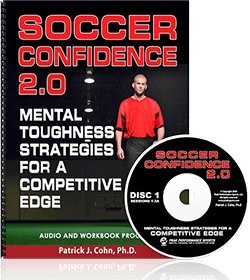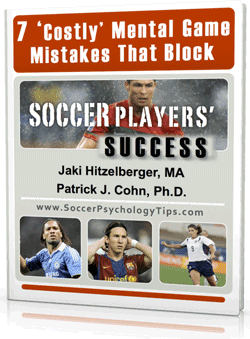Instilling Confidence in Soccer
Today, we are excited to announce the upcoming release of a new CD and Workbook program specifically designed for soccer players and coaches.
The new program is called:
“Soccer Confidence: Mental Toughness Strategies for a Competitive Edge”
Our brand new CD program will be available in about two weeks and we’d like your help!
We don’t want to leave any stone unturned… We’d like to know your (or your players’) top challenges with confidence in soccer.
For Players: What’s your number one challenge with performing with confidence in games?
For Coaches and Parents: What’s your number one question on how to help your players perform with confidence?
Please post your response below under Speak Your Mind.
Your Soccer Mental Game Experts,
Jaki Hitzelberger, MA, MGCP & Dr. Patrick Cohn
P.S. We are committed to creating the best mental training program for soccer players. Please let us know how we can help you have more confidence in practice and games!
Leave your comments below under Speak Your Mind.
Learn Mental Game Secrets to Soccer Confidence!
 Does your confidence seem to disappear when you go from practice to games and don’t know why? Do you get nervous and anxious in big games or when you are under a ton of pressure? Do you get so frustrated when you make a bad pass which causes your confidence to sink?
Does your confidence seem to disappear when you go from practice to games and don’t know why? Do you get nervous and anxious in big games or when you are under a ton of pressure? Do you get so frustrated when you make a bad pass which causes your confidence to sink?
Check out Soccer Confidence: Mental Toughness Strategies For a Competitive Edge
Learn proven strategies to improve focus, composure and confidence so you can perform at your peak in games!
Players: Get the mental edge by learning how to take control of your confidence, mentally prepare for games and perform with composure under pressure.
Trainers: Learn how to give your students the mental game advantage.
Coaches: Boost your team’s confidence using simple proven mental strategies.
Parents: Help boost your soccer player’s confidence. Don’t let their mind hold them back any longer.
Soccer Confidence: Mental Toughness Strategies For a Competitive Edge
What are soccer confidence customers saying?
“Our son plays academy level soccer. Jaki taught him how to focus on goals for each game and practice and understand that mistakes are necessary to grow as a player, and helped his perfectionism. We saw a noticeable difference within one month with improvement each month thereafter. He was more confident, happy, and was having fun again at soccer.”
~Linda, Ryan’s Mother
Do You Make Any of These ‘Costly’ Mental Game Mistakes?
Download our FREE soccer psychology report and discover if you make any of these ‘costly’ mental game mistakes that can block your success.
You’ll discover:
- How your soccer mind can be your best or worst asset on the field.
- How frustration and dwelling are your worst enemy.
- If you are using your soccer mindset effectively before games.
- Learn the important mental game of soccer skills you need to master to boost your confidence and performance.
7 ‘Costly’ Mental Game Mistakes That Block Soccer Players’ Success
What are soccer psychology subscribers saying?
“We try and spend 20 to 30 minutes a day working on the mental aspects of the game. My daughter is really enjoying it and feels it has helped and I know it has worked for her mother and I. I think you need to open a branch up here in Detroit, Michigan because there are a lot of parents and kids up here that need this information. Keep up the good work!”
~Scott Burgess, Soccer Parent
Mental Game Coaching for Soccer Players
Master mental game coach Dr. Patrick Cohn can help you overcome your mental game issues with personal coaching.
You can work with Dr. Patrick Cohn himself in Orlando, Florida or via Skype, FaceTime, or telephone. Call us toll free at 888-742-7225 or contact us for more information about the different coaching programs we offer!
We look forward to helping you improve your mental toughness!
What are our mental coaching students saying?
“Our son plays academy level soccer. Jaki taught him how to focus on mini goals for each game and practice, how to lower his expectations and understand that mistakes are necessary to grow as a player, and helped his perfectionism. We saw a noticeable difference within one month with improvement each month thereafter. He was more confident, happy, and was having fun again at soccer. The confidence has helped him off the field as well to not have to be perfect in everything that he attempts. We can’t say enough about how grateful we are for Jaki!”
~Linda Black, Soccer Mom


Here’s an Example:
Player: How do I keep my confidence after making several mistakes in a row?
Coach: How can I help my team have high confidence when we’re playing a team we’ve lost to?
Parent: What can I say to my son after a loss to help him stay confident?
I find my son play with an exorbitant amount of more confidence in the last game of any tournament than he does in the first 1-2 games. He tends to play “safe” early on. When he unleashes himself he plays so much better. How can we get him to play in the first games like he does in the latter games?
Hi Dave,
Thanks for your questions. This isn’t all that uncommon. Players tend to be more nervous at the beginning of tournaments and then loosen up and feel more confident once they play a game or two. Sometimes players who think they are playing in a “big” tournament, are worried about tough competition or wonder if they will play well. This tends to cause players to try and avoid making mistakes, which inevitably leads to a “safe” performance (as you mentioned).
There’s a numbers of factors that might be preventing him from taking risks early on. From your perspective do you think he is intimidated by the competition, focused on impressing others, fearful of making mistakes, or maybe lacking confidence in his skills?
Dave,
How I, as a coach and parent of players, prepare for the inevitable aspects of loosing a game or winning a BIG match starts with practice and pre-game. Players will always question their abilities individually, but if placed in the greater perspective of where they fit in the “team” concept is extremely important. If they know they will have backup on critical defensive plays or players moving into sound positions on the attack, this can do wonders for their individual and team confidence. After a great play, they will be pumped, give high fives, or an applaud to any involved in the play. Knowing themselves, their collective abilities, and mental preparations go a long way in preparing them to play well. I always tell my players after a good play or bad play: “Get back into the game” because the next play could be the “deciding or pivotal” play of the game! (Are they in position to make the cross, the header, the pass, the deflection?)
One more important point: ENCOURAGE, encourage, encourage, 80% – 20% Correction! Goes a long way in assisting players in knowing you care about them!
Hi Don,
Great points on focusing more on the team than individual performances. When players share a common goal, great things happen. Referring back to Dave’s question, Do you have experience with players being more timid in the first game of tournaments (a number of my athletes say they are)? I work with my players on how to create a pregame routine to ensure they are feeling confident, focused, and ready to trust their skills. I encourage them to use the same routine, no matter how “big” or “important” the game is. I instruct them to treat every game the same and focus on the small things they or their team does well on the field and less about winning or scoring.
Thanks again for your input Don, Cheers!
I practice in an academy with players who are more experienced than I am because I haven’t been playing for very long. I lose confidence sometimes when I make a bad pass, lose the ball, etc, and especially when the player is more skillful than me. Also I am naturally not agressive, so I tend to not play hard and attack. Can you give me some tips to improve, especially with attacking?
Thanks.